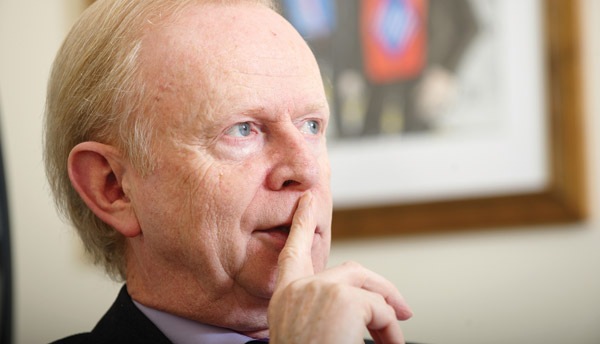Risks but no revival: Reg Empey’s UUP leadership
Sir Reg Empey’s five years as UUP leader in review.
“A mammoth task” admittedly awaited Reg Empey on 25 June 2005 as he took on the UUP leadership but, he continued, “we have faced great adversity before and we will meet the challenge.” Early days saw him trying to stabilize the party after its defeat. Relative political isolation worked to its advantage as he re- organised outdated structures and promoted younger members.
However, a voting pact with the PUP in 2006 proved unpopular with Sylvia Hermon openly opposing the plan. Empey had wanted to bring loyalists into the mainstream and gain an extra unionist minister.
The 2007 Assembly poll saw a levelling out of the party’s vote, down to 103,145 from 127,414 two years previously, and the loss of nine seats. He has kept the UUP in government despite some internal calls for the party to go into opposition. Overall, though, his leadership ran quietly with satisfaction drawn from winning the Dromore by-election in the following February.
With the surprise announcement of the Conservative pact in July 2008, the whirlwind started. The DUP was rattled by the prospect of losing its hardliners to Jim Allister and moderates to both Empey and Cameron. That December was a high point with David Cameron addressing UUP conference delegates in Belfast. Members were sensing a revival after the years of the underdog. Frontbench Tories were more than willing to visit, campaign and even learn from being in government. In return, Conservative and Unionist MPs had the chance of entering a British Government, if elected.
Hopes rose with Jim Nicholson’s re- election but the result was more complex than beating the DUP. Nicholson was an incumbent who gained fewer first preferences (82,893) than before, and the DUP did get more votes in the popular poll.
A large section of unionism was still outside the fold, either more conservative than the Conservatives or opposing from the left. The party straddles both those wings and the enthusiasts for the pact, who saw it as normalisation. Unease grew with the deepening deficit and the Tory drive for spending cuts, with obvious consequences for Northern Ireland. Hermon’s departure left her former colleagues vulnerable.
Voting against justice devolution showed a new assertiveness on the UUP’s part, but the New Force’s Westminster campaign faltered over late candidate selections and Cameron’s comments on public spending. All the stops were pulled out, the peak being the potential PM’s visit to Belfast 36 hours before polling day. Running for South Antrim, Empey wanted to take personal responsibility for the pact and came just under 1,183 votes from winning.
Northern Ireland again woke up “semi- detached” on 7 May, with the pact yielding 102,361 votes but no seats.
His resignation was the natural consequence of the pact’s failure but it marks the end of an eventful leadership where Empey was not afraid to take risks. UUP support has fallen by around 25,000 since 2005, but it could easily have fallen further. Respected for his patience, courtesy and loyalty to the party, he can claim credit for its modernisation and for taking them on a political journey which saw one of the more imaginative ideas in the province’s recent political history.






